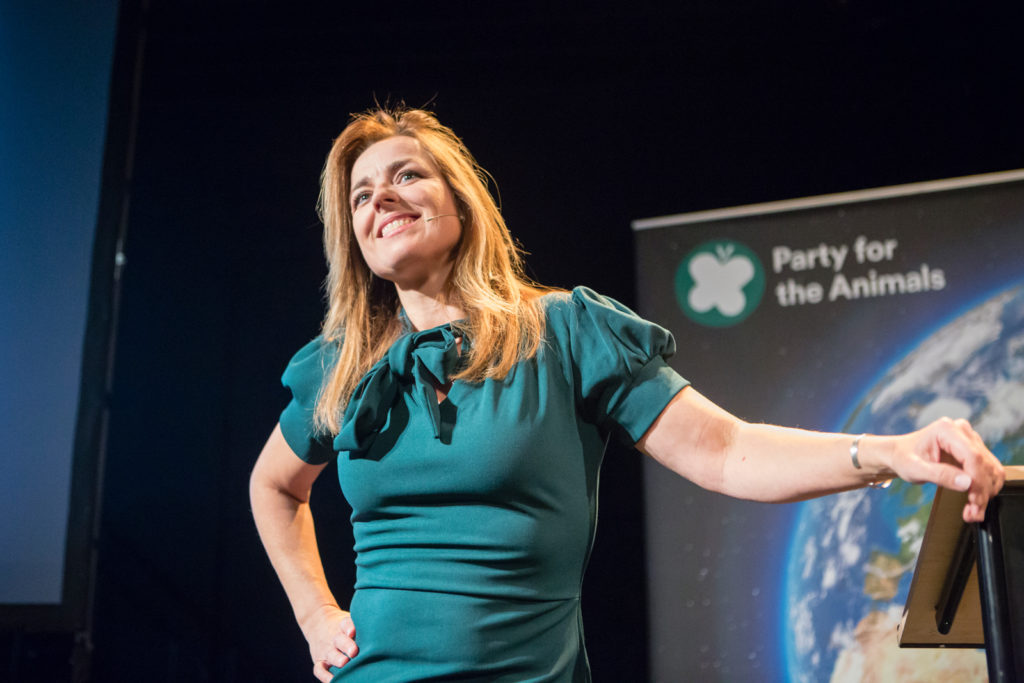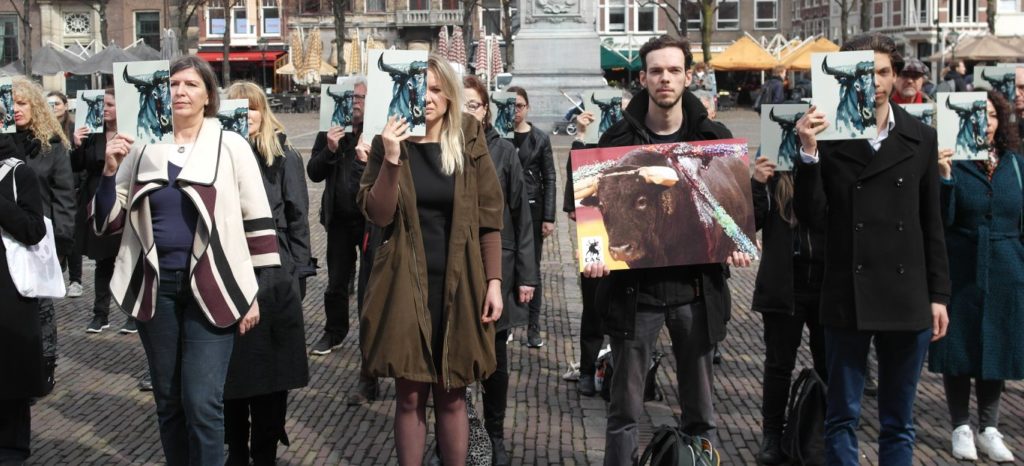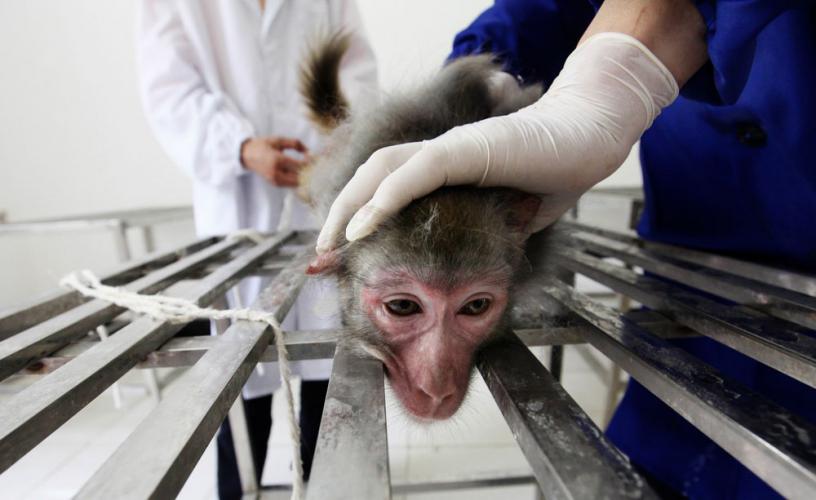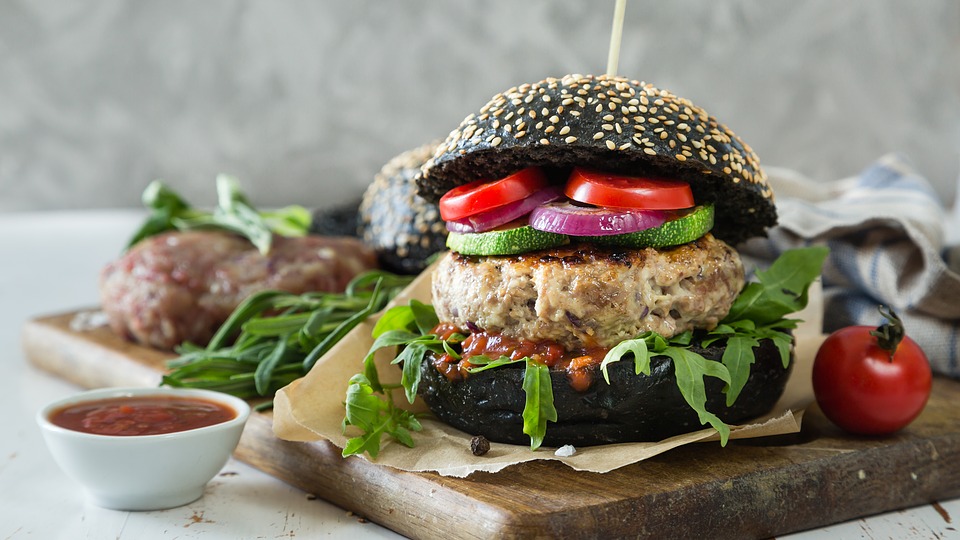Worldlog Marianne Thieme 1 maggio 2018
The 22nd of April was International Earth Day. On that day, people all over the world reflect on all the beauty of the earth. Such a day demonstrates well that the problems surrounding nature, environment and climate change are transboundary and that we should collaborate to tackle these problems. I see that such awareness is growing, wherever I go. Just recently, I was in Sweden and Germany to give lectures. I was invited to Sweden by our sister party Djurens parti and to Germany by a theological university. The lecture in Germany was attended by visitors from Georgia, Hungary, the Czech Republic and Ghana among others. It’s wonderful to see that increasingly more people from different backgrounds are demanding a different kind of politics: politics focussed on sustainability and compassion instead of economic growth.

Marianne during her lecture in Sweden
Together we are in strong position: This is also demonstrated by the fight against bullfighting. Thanks to an international campaign conducted by CAS International, the European Parliament decided in 2015 that the European Union must stop its subsidies for bullfighting. The Dutch Lower House already accepted our motion to stop those subsidies in 2013. The European Commission has, however, ignored the wish of the European Parliament for years. But the EU subsidy policy is currently being reviewed, so there’s a chance again that the European Commission will decide not to invest any more money in the bullfighting industry. On the 4th of April, CAS International protested against the current European subsidies, opposite the Lower House, and our MEP Anja Hazekamp attended this protest, together with our member of the Lower House, Femke Merel Arissen. You, as a citizen, can also help to pressure European policy makers: sign the petition against the European subsidies for bullfighting here !

Femke Merel and Anja Hazekamp of the Party for the Animals at the protest against subsidies for bullfighting
The 24th of April was World Lab Animals Day. Worldwide, the number of animals that are used in animal testing is estimated at 115 million every year, of which 12 million animals are used in Europe. The Netherlands even has the largest Primate Testing Lab of Europe, the BPRC. 1500 monkeys are used there in gruesome experiments. Some monkeys get electrodes placed in their heads while others are made ill with the most horrifying diseases. We have drawn attention to what’s happening to those monkeys but also to the millions of other animals that are pointlessly used as testing animals all over the world. The Dutch government has said before that the Netherlands must be frontrunner in research without animal testing. So, it’s odd that an institute such as BPRC is still open.
Certainly, in these times of quick innovations and technological developments, there are sufficient alternatives for animal testing, but our governments refuse to invest enough money into them. We keep pressuring the government and the EU to stop the cruelties in the animal testing industry!

Experiments on monkeys
Almost half of all grains and vegetable proteins that are grown all over the world are fed to farming animals. What a waste of farming land, water and food that humans could eat directly. Our huge meat consumption is decadent. Even the most mainstream institutes and companies are now aware of this. The authoritative institute the World Food Organisation already sounded the alarm bell because the livestock industry poses a threat to our food security, nature and the environment. This month, the Council for the Living Environment and Infrastructure (an important advisory council of the Dutch government) adopted an urgent advice: the livestock industry must be considerably decreased to be able to achieve the Paris climate objectives and consumers must make their contributions too by consuming less meat and dairy products.

Vegan burger
But despite this scientific advice of its own advisory council, the Dutch government is hiding its head in the sand again and is ignoring the advice. The government’s intense lobbying this month even achieved that Dutch veal meat can be exported to China again. One of the most climate-, environmentally and animal-unfriendly measures a government can take. But fortunately, we see that others do dare to contribute to a positive change for humankind, animals and the environment. Increasingly more companies and educational institutes aim at local, organic and vegetable products. Read here the article of The Guardian about how veganism is becoming more mainstream.
Until the next time!
Marianne
Il 22 aprile era il Giorno Internazionale della Terra. Questo giorno in tutto il mondo la gente riflette sulle bellezze della terra. Tale giorno mostra che i problemi intorno alla natura, l’ambiente e i cambiamenti climatici sorpassano le frontiere e che dobbiamo lavorare insieme per gestirli. Vedo sempre piu’ presente questa consapevolezza, dovunque io vada. Recentemente ero in Svezia e Germania per fare delle relazioni. In Svezia ero stata invitata dal partito per gli animali Djurens parti e in Germania mi aveva invitato un’universita’ teologica. Dalla relazione in Germania erano presenti degli ospiti dalla Georgia, l’Ungaria, La Repubblica Ceca e dal Ghana. E’ bellissimo vedere che persone di background sempre piu’ diversi chiedono di avere una politica di un altro tipo: una politica puntata sulla sostenibilita’ e la compassione invece che della crescita economica.

Marianne durante una relazione in Svezia
Insieme siamo piu’ forti: questo viene dimostrato anche dalla battaglia contro i toreri. Grazie ad una campagna internazionale guidata da CAS International, il Parlamento Europeo decise nel 2015 che la Unione Europea doveva fermare gli incentivi per la corrida. Gia’ nel 2013 anche la Camera olandese acceto’ una mozione per terminare questi incentivi. La Commissione Europea ignoro’ per vari anni il desiderio del Parlamento Europeo. Ma al momento viene rivalutato il programma finanziario degli incentivi UE, creando un’altra possibilita’per una decisione dalla Commissione Europea di terminare gli incentivi nell’industria della corrida. Il 4 aprile la CAS International protestava davanti alla Camera all’Haya contro i presenti incentivi europei ed il nostro europarlamentare Anja Hazekamp era presente alla manifestazione, insieme al nostro membro della Camera Femke Merel Arissen. Anche voi come cittadini potete aiutare a fare pressione ai politici europei: firmate qui la petizione contro gli incentivi europei dedicati alla corrida!

Femke Merel e Anja Hazekamp del Partito per gli Animali durante la protesta contro gli incentivi per la corrida
Il 24 aprile era il giorno mondiale per le sperimentazioni sugli animali. Si stima che circa 115 milioni di sperimentazioni sugli animali vengono effettuate ogni anno nel mondo, di cui 12 milioni di animali in Europa. I Paesi Bassi hanno addirittura il centro per primati piu’ grande dell’Europa, il BPRC. In questo luogo vengono sottoposte 1500 scimmie all anno a crudeli sperimentazioni. Nelle teste delle scimmie vengono impiantati degli elettrodi ed altre sono fatte ammallare con orrende malattie. Abbiamo chiesto l’attenzione per il destino di queste scimmie, ma anche per milioni di altri animali che vengono utilizzati inutilmente in tutto il mondo per le sperimentazioni. Il governo ha gia’ detto che nel 2025 i Paesi Bassi dovranno essere la prima nazione nell’ambito delle sperimentazioni prive di animali. Visto questo, naturalmente non si spiega l’esistere di un istituo come il BPRC.
Soprattutto in questo tempo di rapide innovazioni e sviluppi tecnologici, esistono alternative a sufficienza per le sperimentazioni sugli animali, ma i nostri governi si rifiutano di investire abbastanza soldi in questa cosa. Noi continuiamo a dare pressione alla UE per terminare le crudelta’ dell’industria delle sperimentazioni con gli animali!

Sperimentazioni sulle scimmie
Quasi la meta’ di tutti i cereali e proteine vegetali che crescono nel mondo, vengono dati al bestiame. Che spreco di terra agricola, acqua e cibo che potrebbero essere mangiato direttamente dall’uomo! Quindi il nostro consumo di carne e’ un lusso. Questa consapevolezza comincia ad arrivare addirittuare alle aziende piu’ comuni. Il rinnomato istituto Organizzazione Alimentare Mondiale, e’ stato il primo a segnalare l’emergenza della minaccia dell’industria del bestiame per la nostra sicurezza alimentare, la natura e l’ambiente. Questo mese anche il Consiglio per l’Habitat e l’Infrastruttura (un consiglio importante del governo olandese) ha espresso un urgente consiglio: il bestiame deve essere ridotto moltissimo per raggiungere gli accordo climatici di Parigi e anche i consumatori devono fare la loro parte mangiando meno carne e latticini.

Burger vegano
Di nuovo il governo olandese sceglie di ignorare il consiglio scientifico del proprio consiglio. Questo mese il governo ha addiritura tramite una intensa lobby consentito di nuovo che la carne di vitello olandese possa essere esportata in Cina. E’ tra le decisioni piu’ detrimentali per il clima, l’ambiente e gli animali che un governo possa prendere. Fortunatamente vediamo invece che altri hanno il coraggio di contribuire ad un cambiamento positivo per l’uomo, l’animale e l’ambiente. Sempre piu’ aziende ed istituti formativi locali puntano sui prodotti biologici e vegetali. Leggete qui l’articolo del Guardian sulla sempre piu’ grande popolarita’ del veganismo.
Alla prossima volta!
Marianne